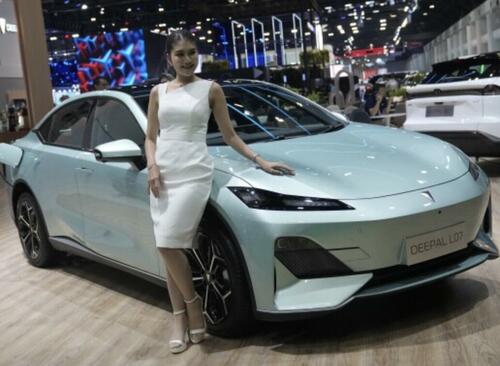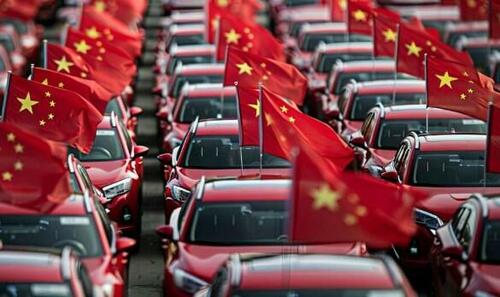Japan’s hold on Thailand’s auto market is quickly slipping as Chinese brands make big gains. Japanese automakers’ market share fell to 65% in April—down over 10 points from a year earlier and far below the ~90% they once enjoyed, according to Toyota Motor Thailand data.
Meanwhile, six Chinese-owned brands doubled their share to a record 24%, led by BYD at 14%, according to Nikkei.
While Thailand’s auto market grew just 1% year-on-year to 47,193 vehicles—thanks to a boost from the Bangkok International Motor Show—sales are being held back by high household debt and tough auto loan approvals, keeping monthly sales at around 40,000 units. Even pickup truck sales, the “national car,” have slumped 21%.
Toyota’s April sales fell 8% but it still led with 38% share. Isuzu dropped 18% to 12% share, Honda’s sales plunged 42% to 7% share, and Mitsubishi’s sales fell 21% to 4%.
Nikkei writes that Chinese automakers saw huge growth: BYD sales jumped 7.3 times, giving it 14% share, passing Isuzu and Honda. MG’s share hit 5% with a 46% sales increase, while Changan hit 3% after a 53% rise.
Driving China’s surge: BYD’s aggressive discounting at the motor show, plus new plug-in hybrids and EVs. BYD’s sales now outpace Japanese brands in some segments.
Recall, we wrote last month how China part makers in Thailand had tripled.
And we said we couldn’t help but notice the timing – with tariffs on goods coming from China through the roof – seems to be…coincidentally beneficial for Chinese corporations.
In the Eastern Economic Corridor, about two hours from Bangkok, new factories are rapidly rising. Battery maker Sunwoda Electronic is investing over $1 billion to build a lithium-ion battery plant, with mass production set for 2025. Battery cells will be made locally, and a Thai official noted it’s likely to become Southeast Asia’s first plant producing batteries from cells.
More than 20 Chinese auto brands, including BYD and Great Wall Motor, have entered Thailand.
BYD’s factory, which began production in July 2024, is becoming the hub of a growing supply chain. Alongside Sunwoda, battery makers CALB, Gotion, and SVOLT have started local production, while CATL is building a joint venture plant with Thailand’s state-owned PTT.
However it may not all be tariff related. Nikkei writes that Chinese manufacturers began accelerating their investments in Thailand around 2018, amid rising U.S.-China trade tensions.
As of March, Chinese-invested auto parts companies in Thailand reached 165—over triple the number from the end of 2017. Across Southeast Asia, Chinese companies established more than 7,000 firms by 2023, with direct investment topping a record $25 billion that year.
This growth is expected to continue. In April, Ningbo Tuopu Group announced plans to invest up to $300 million in a Thai factory, saying the move would help it “win more orders and strengthen support for important foreign customers.”
Nikkei writes that Japanese automakers, dominant in Thailand since the 1960s, have built a network of about 1,400 local suppliers through joint ventures and vertically integrated operations. In contrast, Chinese carmakers are building independent supply chains, often excluding Japanese-linked suppliers.
Chinese parts are nearly 30% cheaper than those from Japanese firms, and Chinese companies typically produce core components like batteries in-house or source them from affiliated suppliers. “Thai suppliers will not be able to fully benefit from the Chinese push into the country,” Sompol said.
Loading…



















